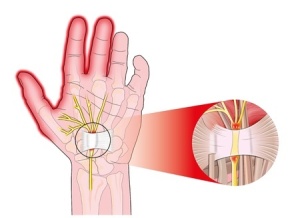 Carpal tunnel syndrome is a common condition. According to a recent report in the New York Times*, it affects 3% of women across the US and 2% of men; with women over the age of 55 being most at risk. It’s caused by the compression of the median nerve, and causes tingling and weakness in the hands.
Carpal tunnel syndrome is a common condition. According to a recent report in the New York Times*, it affects 3% of women across the US and 2% of men; with women over the age of 55 being most at risk. It’s caused by the compression of the median nerve, and causes tingling and weakness in the hands.
Signs of Carpal Tunnel Syndrome
Symptoms of carpal tunnel syndrome tend to be fairly easy to spot. These include:
- Tingling, Numbness and Discomfort. The most common symptoms are a sense of discomfort, ‘coldness’ or numbness in the hands. It’s most likely to manifest itself in the thumb, index or middle finger (though may also be found in the ring finger).
- Weak Muscles. A possible symptom of carpal tunnel syndrome is weakened muscles around the base of the thumb.
- Pins and Needles. Some sufferers also report a sensation not dissimilar to pins and needles in the fingers.
- Edema and changes to the skin. Occasionally, the condition can also cause swelling in the hand, dry skin and changes to the color of the hand.
Treatment for Carpal Tunnel Syndrome
Treatment for the condition varies, depending on how severe it is. For less extreme cases, there are a range of non-surgical treatments to combat the symptoms, including wrist splints and corticosteroid injections.
If your symptoms are more severe, surgery may be recommended. The procedure is a relatively straightforward one. You won’t need to stay overnight in a hospital, and it can be performed under local anesthetic. It’s often performed as open surgery with a single incision to the wrist; though in some cases, keyhole surgery may be the preferred option.
After surgery, you can use your hand for light activity, though it’s recommended that you don’t undertake any heavy lifting or activity that could put strain on the wrist for several weeks after the procedure.
*NYTimes. (2013). Carpal Tunnel Syndrome. Retrieved from http://www.nytimes.com/health/guides/disease/carpal-tunnel-syndrome/risk-factors.html




